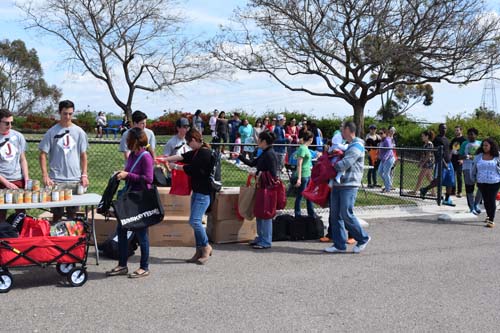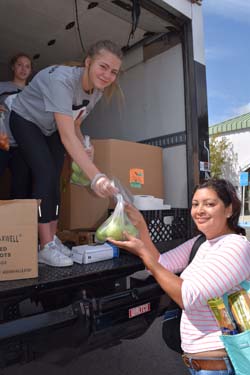
By Donald H. Harrison


SAN DIEGO – Jewish Family Service, Mazon (The Jewish Response to Hunger) and now Democratic U.S. Rep. Susan Davis, ranking member of the Military Personnel Subcommittee of the House Armed Services Committee, are teaming up to help alleviate food insecurity among the families of the lower enlisted ranks of the military.
Davis, in an interview with San Diego Jewish World, said she will seek to insert in the federal budget a small pay raise for military personnel, and additionally, will seek congressional approval to instruct the Department of Agriculture to remove bars to eligibility for Food Stamps for needy military families.
Mazon has been advocating for such steps on Capitol Hill, and is helping to publicize the issue by calling on Jewish families to read a Fifth Question during their Passover seders: “Why is the Department of Defense letting military families struggle to put food on the table?”
Jewish Family Service of San Diego for nearly a decade has been distributing food to an average of 75 needy families one Sunday a month at Camp Pendleton, Marine Corps Base, and more recently, to the same number of families at the Murphy Canyon Navy Housing complex in San Diego. Other charitable organizations have similar food distributions on other days throughout the month.
“We purchase food in bulk at 19 cents a pound from the local food bank and from Feeding America and set up long tables, and we have different items that are available – canned items and non-perishables, but also fresh produce, diapers and other hygiene items,” said Shana Hazan, JFS senior director of resource development. “The military families get to go through and ‘shop’ for the items that they want.”
Aware that some military families are embarrassed by their need for food assistance, JFS strives to make the Sunday distributions as dignified as possible, explains Sasha Escue, coordinator of the JFS Hand Up Youth Food Pantry and onsite coordinator of these events. Rather than simply hand bags full of food to the recipients, JFS lays out the selections on long tables—with student volunteers from J-Serve there to explain what the limit of that item is per family. While the mothers—and sometimes the fathers—select the free goods, which JFS calls “shopping,” their children enjoy a close-by playground or participate in art classes staffed by volunteers.
I recently attended a food distribution at the Murphy Canyon Navy Housing Complex in the Tierrasanta area, and two Navy wives—who told their first names but not their last names—described the difficulties they have putting food on the table for their families.
Eloisa is a stay-at-home mother of two children, who had to give up a job when she was unable to obtain affordable day care. “So my income went away and now my husband is the only one receiving a paycheck.” Recently her husband was promoted to an E5 rank, and “you have to wait six months for that income to come in.” In the meantime, she added, “you have to pay for the uniforms to get changed. Also our rent just went up because they looked at different communities to compare rents, and they raised our rates.”
To try to make ends meet, “with my friends we do these different food drives, we are couponing, and I look for different yard sales. I buy my daughter used hand-me-downs. I can buy a $20-lot of clothes compared to buying her two outfits at the store. My children are so young, they grow out of things fast.”
When we met, it was the second JFS Food Distribution Eloisa had attended. “The last month I came they gave me a duffel bag and I filled it up with various canned foods, pasta, peanut butter, and they give you diapers, which always helps out.”
She said she was not eligible for the Food Stamp program, which officially is known as the Supplemental Nutrition Assistance Program (SNAP). In California, SNAP is called “Cal-Fresh.” The reason: “My husband earned too much” as a result of his base housing allowance being figured into his income.
Lily, whose husband is an E4, was standing in line next to Eloisa. She said her situation was much the same, “with the only difference is that her girls are close in age so they can pass clothes back and forth. Having boys, it is a little harder. Not many people are willing to sell off clothes and give things away free.”
In addition to JFS and other food distribution programs, Lily said, she has been aided by San Diego Moms, “which helps with household stuff, and baby things” and by San Diego Home Front, “which helped us with furniture, thank God; that was one less thing to worry about.” Lily is pregnant and has two children. “We didn’t think we could get pregnant again so fast, so I got rid of everything before moving here. Now we have to start all over again.”
JFS staff members have met many military wives who are struggling. “The last time I went up to Camp Pendelton, I was approached by a woman who was pregnant and had a couple of little ones under the age of five as well,” commented Sherry Fusco, JFS director for nutrition services. The woman’s husband had been injured by an Improvised Explosive Device (IED) on his second tour, and “on his third tour he was more seriously injured and he was recovering,” Fusco said. “The mother couldn’t work, and he was going through major therapy and surgery. He had specific needs as far as diet, and we were able to meet some of those needs. So she said if it weren’t for JFS, she wouldn’t have known what to do because she couldn’t get that kind of food from the commissary.”
The woman’s husband “is going through so many things: the trauma of being injured, the trauma of not being there with his team; it is that human side we need to realize,” Fusco added. “These families are sacrificing so much and sometimes they are caught in between, sometimes deployed, sometimes recovering from an injury. We are there for different needs, and every family has a different story.”

Jennifer Levitt of La Jolla, a former board president of Jewish Family Service, distributed food and diapers with her daughter Gabi, a student at Francis Parker School. “Working at the distribution certainly emphasizes how important this programming is,” said Levitt. “Seeing folks who are serving our country lining up for food and diapers is a pretty humbling experience.” Why the families don’t have enough for food “is a very important question and there are other challenges that military families face due to child care because one partner is deployed and the other partner is less employable. Because they move so often from base to base, it is difficult for both partners to find employment.”
Abby Leibman, chief executive officer of Mazon, reflected in an interview that “what we’ve got is people for whom we have a great deal of regard and on whom we have placed a great deal of responsibility and yet we are watching them struggle. The Department of Defense is not providing them with really adequate resources to address whatever the shortfall might be between what their salaries are and how to keep their families well fed.”
Josh Protas, director of governmental affairs at the Mazon office in Washington D.C., said salaries for an E4 and an E5 are currently $24,552 and $26.777. They receive in addition $2,016 and $2,160 respectively for housing. That brings their monthly incomes, including the allowance for base housing, to $4,062 and $4,391.40 respectively. The E4 family of four earns $20 a month more than is permitted to be eligible for SNAP.
Asked what would prompt people to oppose increasing benefits for the families of lower ranking enlisted personnel, Leibman said: “The things that we have heard are that these are 19-year-olds, never had a paycheck before and went out and bought a Camaro, or a new TV, or you name it, and that they have squandered their money. But, in fact, the volunteer military has aged into a much older average age than what it used to be – especially during the recession when it became an opportunity for some financial stability. You have people who have been in the workplace before but have families – they are not young 19 year old sailors out for a good time.”
Congresswoman Davis told San Diego Jewish World that she feels “very strongly that members of our military – the troops, men and women – must be paid adequately. There is no question about that.”
“There was a raise just last year, and there will be a raise again in the bill we are looking at now, probably about the same as last year which was about 1.3 percent. That costs $1 billion, so for every 1 percent it is another billion dollars. We also have other federal employees so if you give a 1 percent raise to the military, you have to do that pretty much for federal workers. Don’t forget we have federal workers that are on the front line too. Whether they are working in the State Department, or in USAID, there are all kinds of places where we put them in harm’s way.”
Davis said she will push legislation that will exclude the base housing allowance from being counted as income for the purpose of Food Stamps.
Concerning military dependents not being able to find day care for their children, the congresswoman said, “There are day care centers for the military; there just aren’t enough. When they go out into the private sector that is more costly. Sometimes families join together. If you have a mom, say, who has 2-3 kids and there are 8 kids in the neighborhood who could use child care, they will work with her to get her certified so she can work as a child care giver and then she hires the appropriate number of people to work with her.”
When moms want to work, according to the ranking member of the Military Personnel Subcommittee, “the military hires a lot of spouses, probably not enough, but they do hire a lot. There are programs for service wives to be able to brush up on their educations and be able to work in the private sector.”
Even so, said the congresswoman, “there aren’t enough options out there.”
*
Harrison is editor of San Diego Jewish World. He may be contacted via donald.harrison@sdjewishworld.com Comments intended for publication in the space below must be accompanied by the first and last name of the letter writer as well as by his/ her city and state of residence (city and country for those outside the U.S.)
Pingback: Results mixed in Davis' drive to improve military benefits - San Diego Jewish World